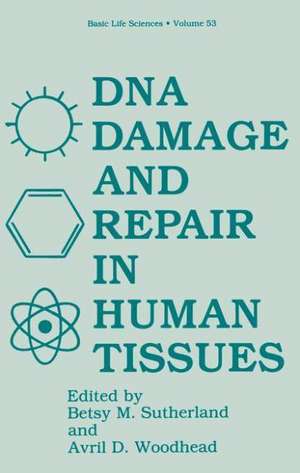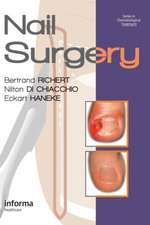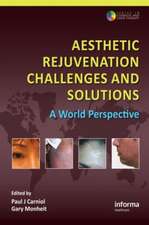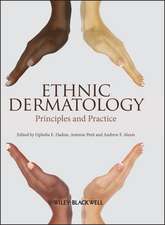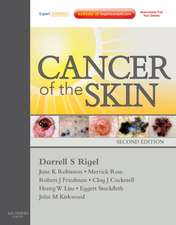DNA Damage and Repair in Human Tissues: Basic Life Sciences, cartea 53
Editat de Betsy M. Sutherland, Avril D. Woodheaden Limba Engleză Paperback – 12 oct 2011
Din seria Basic Life Sciences
- 5%
 Preț: 378.07 lei
Preț: 378.07 lei - 15%
 Preț: 647.73 lei
Preț: 647.73 lei - 5%
 Preț: 383.55 lei
Preț: 383.55 lei - 15%
 Preț: 649.06 lei
Preț: 649.06 lei -
 Preț: 401.03 lei
Preț: 401.03 lei - 5%
 Preț: 730.71 lei
Preț: 730.71 lei - 5%
 Preț: 736.92 lei
Preț: 736.92 lei - 5%
 Preț: 726.68 lei
Preț: 726.68 lei - 5%
 Preț: 729.26 lei
Preț: 729.26 lei - 18%
 Preț: 960.61 lei
Preț: 960.61 lei - 5%
 Preț: 375.85 lei
Preț: 375.85 lei - 5%
 Preț: 744.05 lei
Preț: 744.05 lei - 5%
 Preț: 740.58 lei
Preț: 740.58 lei - 5%
 Preț: 733.82 lei
Preț: 733.82 lei - 5%
 Preț: 719.38 lei
Preț: 719.38 lei -
 Preț: 397.59 lei
Preț: 397.59 lei - 5%
 Preț: 390.85 lei
Preț: 390.85 lei - 15%
 Preț: 657.57 lei
Preț: 657.57 lei - 5%
 Preț: 382.99 lei
Preț: 382.99 lei - 5%
 Preț: 400.56 lei
Preț: 400.56 lei - 5%
 Preț: 739.69 lei
Preț: 739.69 lei - 15%
 Preț: 657.25 lei
Preț: 657.25 lei - 18%
 Preț: 959.67 lei
Preț: 959.67 lei -
 Preț: 401.24 lei
Preț: 401.24 lei - 15%
 Preț: 658.88 lei
Preț: 658.88 lei - 5%
 Preț: 387.39 lei
Preț: 387.39 lei - 5%
 Preț: 376.95 lei
Preț: 376.95 lei - 5%
 Preț: 768.39 lei
Preț: 768.39 lei - 5%
 Preț: 735.83 lei
Preț: 735.83 lei - 15%
 Preț: 651.19 lei
Preț: 651.19 lei - 18%
 Preț: 1228.47 lei
Preț: 1228.47 lei - 15%
 Preț: 595.36 lei
Preț: 595.36 lei - 5%
 Preț: 736.39 lei
Preț: 736.39 lei - 5%
 Preț: 730.55 lei
Preț: 730.55 lei - 18%
 Preț: 960.30 lei
Preț: 960.30 lei - 5%
 Preț: 738.93 lei
Preț: 738.93 lei - 15%
 Preț: 662.16 lei
Preț: 662.16 lei - 15%
 Preț: 663.60 lei
Preț: 663.60 lei -
 Preț: 395.25 lei
Preț: 395.25 lei - 5%
 Preț: 739.13 lei
Preț: 739.13 lei - 15%
 Preț: 639.59 lei
Preț: 639.59 lei - 5%
 Preț: 377.52 lei
Preț: 377.52 lei - 5%
 Preț: 721.40 lei
Preț: 721.40 lei - 18%
 Preț: 1241.10 lei
Preț: 1241.10 lei - 18%
 Preț: 1233.69 lei
Preț: 1233.69 lei
Preț: 382.62 lei
Preț vechi: 402.76 lei
-5% Nou
Puncte Express: 574
Preț estimativ în valută:
73.24€ • 79.58$ • 61.56£
73.24€ • 79.58$ • 61.56£
Carte tipărită la comandă
Livrare economică 21 aprilie-05 mai
Preluare comenzi: 021 569.72.76
Specificații
ISBN-13: 9781461279037
ISBN-10: 1461279038
Pagini: 480
Ilustrații: 474 p.
Dimensiuni: 170 x 244 x 25 mm
Greutate: 0.76 kg
Ediția:Softcover reprint of the original 1st ed. 1990
Editura: Springer Us
Colecția Springer
Seria Basic Life Sciences
Locul publicării:New York, NY, United States
ISBN-10: 1461279038
Pagini: 480
Ilustrații: 474 p.
Dimensiuni: 170 x 244 x 25 mm
Greutate: 0.76 kg
Ediția:Softcover reprint of the original 1st ed. 1990
Editura: Springer Us
Colecția Springer
Seria Basic Life Sciences
Locul publicării:New York, NY, United States
Public țintă
ResearchCuprins
DNA Lesion Measurement in Human Tissues.- Measurement of DNA Adducts by Immunoassays.- Detection of Human DNA Adducts by 32P-Postlabeling.- Immunologic Methods for the Detection of Carcinogen Adducts in Humans.- Lesion Measurement in Non-Radioactive DNA by Quantitative Gel Electrophoresis.- Fluorescence Detection of Lesions in DNA.- Damage and Repair in Skin.- Solar Radiation Induced Skin Cancer and DNA Photoproducts in Humans.- Defective DNA Repair in Humans: Clinical and Molecular Studies of Xeroderma Pigmentosum.- 5-MOP Induced Protection Against Epidermal DNA Damage by Ultraviolet Radiation in Human Skin.- Variability in DNA Repair in Human Skin.- Effects of Chemicals on Photobiologic Reactions of Skin.- Repair of 8-MOP Photoadducts in Human Lymphocytes.- Human Skin: Biochemistry and Molecular Biology.- DNA Damage and Repair in Human Skin: Pathways and Questions.- Unscheduled DNA Synthesis in Human Skin.- DNA Repair in Mammalian Tissues and Cells.- Damage Specific Mammalian Endonucleases.- Model Systems for Human Skin.- Characteristics of DNA Excision Repair in Nondividing Xeroderma Pigmentosum Cells, Complementation Group C.- Prospects for Epithelial Gene Therapy.- The Significance of DNA Damage and Repair Mechanisms in Health Risk Assessment.- DNA Damage and Repair in Human Blood Cells.- Measurements of Genomic and Gene-Specific DNA Repair of Alkylation Damage in Cultured Human T-Lymphocytes.- Peripheral Blood Leukocytes as a Surrogate Marker for Cisplatin Drug Resistance: Studies of Adduct Levels and the Repair Gene ERCCl.- Factors Which Affect DNA Repair in Human Lymphocytes.- Methyl Transferase Activity in Secondary Leukemia.- The Single Cell Gel Assay: A Sensitive Technique for Evaluating Intracellular Differences in DNA Damage and Repair.- Detection and Analysis of Human Mutations.- Cytogenetic Investigations of DNA Damage in Aging: A Twin Study.- Studies of DNA Alterations in In Vivo Somatic Cell Mutations in Humans.- Mechanisms of Induction of Specific Chromosomal Alterations.- Unfolding Perspectives on the Genetic Effects of Human Exposures to Radiation.- Effects of Caloric Restriction on the Maintenance of Genetic Fidelity.- Internal Organs.- Oncogenes and Tumor Suppressor Genes Involved in Human Lung Carcinogenesis.- Activation of Carcinogens by Human Liver Cytochromes P-450.- Repair of 06-Methylguanine Damage in Normal Human Tissues.- Repair of 04-Alkylthymine Damage in Human Cells.- Alkylation Repair in Human Tissues.- Participants.
